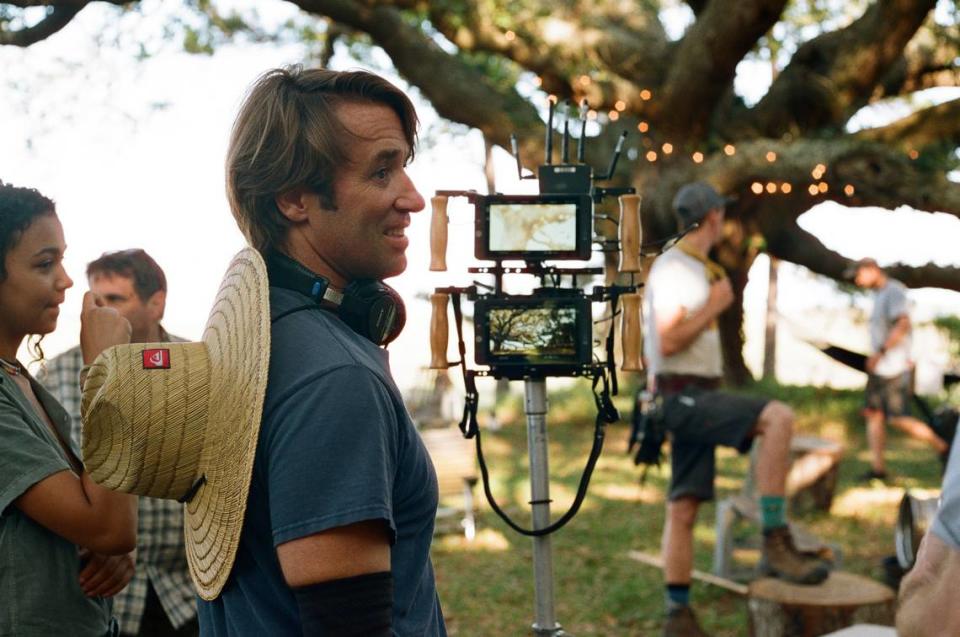Lawyers for ‘Outer Banks’ creators challenged NC teacher’s lawsuit. Judge dismissed it
A high school English teacher who accused Netflix of ripping off his treasure-hunting young adult novel to create the hit Netflix series “Outer Banks” lost his case Tuesday when a federal judge determined he failed to show any substantial similarities between the two works.
In a 25-page opinion, U.S. District Judge Timothy C. Batten Sr. said Kevin Wooten’s 2016 book “Pennywise: The Hunt for Blackbeard’s Treasure!” had a significantly different plot, characterization, mood, pace and settings than the Netflix original.
“To be sure, both works involve shipwrecks and treasure hunts,” Batten said. “But to analyze their plots at such a high level of abstraction would render every work involving a hunt for buried treasure susceptible to copyright infringement.”
The suit named Netflix and “Outer Banks” co-creators Josh Pate, Jonas Pate and Daniel Burk as defendants. Jonas Pate declined to comment on their behalf in a statement to McClatchy News on Wednesday.
Lawyers representing Wooten did not immediately respond to a request for comment.
“Outer Banks” premiered on Netflix in April 2020. The show was largely a hit, and Netflix confirmed production for a second season was underway in July.

Wooten is an English and creative writing teacher who lives in Hamptonville, North Carolina, about 65 miles north of Charlotte. He sued Netflix and the show’s creators for copyright infringement just before Christmas.
According to court filings, Wooten’s novel “Pennywise” centers on a former creationist professor searching for Blackbeard’s treasure with his middle school-aged twin nephews along with their family dog Skipper. The treasure contains the Holy Grail, and the professor wants to protect it from an evil scientist named “Darwin” who “plans to test Jesus’s DNA, prove he was an ordinary man, and undermine Christianity,” defense attorneys said.
“Outer Banks,” meanwhile, stars four teenagers on the North Carolina coast searching for hidden treasure and includes elements of class and poverty, physical abuse, drugs and sexuality.
In a seven-page chart attached to his complaint, Wooten’s attorneys laid out the reported similarities between his self-published novel and the Netflix series. They said the two works shared similar characters — a group of four “treasure hunters” — and related clues.
But the judge said Tuesday many of those similarities seemed “random.”
In one example, Wooten compared a clue his characters discovered in the wing of a bird to a clue labeled “For Bird” in the TV show. The “Outer Banks” clue referenced a nickname given to one of the protagonists by his father.
“The fact that the word ‘bird’ is present in both narratives is entirely innocuous and of no significance in an infringement analysis,” Batten said.
He also found many of the comparable scenes fall under what’s known as “scènes à faire,” meaning stock scenes that are common in a particular genre and not protected by copyright.
“(Wooten) highlights that both works involve chases through mausoleums or graveyards, the retrieval of treasure from a deep shaft, and the discovery of clues in old portraits,” Batten said. “But each of these events ‘naturally arise[s] from the generalized theme of’ a treasure hunt.”
As for specific ideas in the two works, the judge determined the plot of Wooten’s “religious narrative” looked nothing like that of “Outer Banks,” the characters “share few similarities, even when painted with the broadest brush,” and the mood and pace of the two stories “vary greatly.”
His opinion largely echoed arguments made by defense attorneys in a previous motion to toss the suit, which described the two works as “radically different.”
Defense attorneys for Netflix and the co-creators accused Wooten of “cherry-picking” similarities, saying any parallels between the middle-aged hero and his two nephews in Wooten’s novel and the “Outer Banks” protagonists are “at best misleading and at worst absurd.”
The motion to dismiss also called out “problematic gender stereotypes” Wooten made between a dog in his novel and the character Kiara in “Outer Banks.” Wooten had described them as exhibiting masculine and feminine characteristics because the male dog was “protective as a mother” and Kiara, a teenage girl, was a “tomboy.”
“Plaintiff’s (offensive) effort to compare a pet to a complex central character highlights his inability to identify comparable characters,” the motion states.
Tuesday’s opinion dismisses Wooten’s case with prejudice, meaning he is not allowed to refile the complaint on the same grounds.
Creator of Netflix’s ‘Outer Banks’ — who’s from NC — explains show’s geography snafu
A guide to all the times North Carolina gets a shout-out in Netflix’s ‘Outer Banks’
Massive quartz cluster stolen from North Carolina gem mine sparks search, police say

